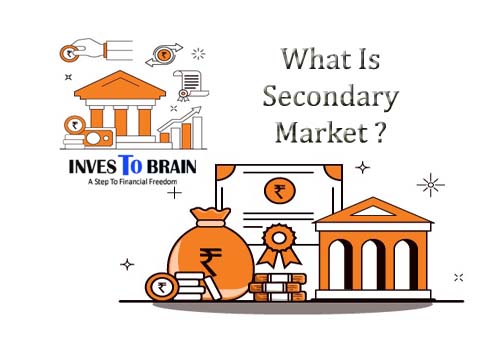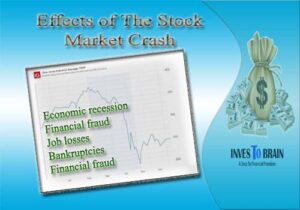Secondary Market: Meaning, What is the secondary market, Understanding the secondary market, Features of the secondary market, Importance of a Secondary Market, Participants in the secondary market, Functions of the secondary market, Conclusion
Investors exchange their securities with each other in the secondary market whether in the primary market investors buy securities directly from issuing entity.
There are massive independent and interconnected transactions happening, secondary market maintains a record of all transaction and lead the price of securities toward their actual value.

Secondary Market
What is the secondary market?
The secondary market provides a platform for investors, where investors buy and sell securities they already own.
Investors buy and sell securities with each other and the price of securities depends on the secondary market as per demand and supply rules.
The price of securities in the primary market is often set beforehand, though the price of securities in the secondary market depends upon the basic principle of supply and demand.
Let’s look at a scenario – If a company posts a lifetime high and shows growth potential in the future then the majority of investors believe a stock will increase in value and rush to buy it, and the price of the stock will increase.
If a company posts losses and investors do not interest to buy stocks then stock demand declines so prices of the stock will be down.
Understanding the secondary market
What is the secondary market according to Wikipedia as follows-
The secondary market, also called the aftermarket and follow on public offering, is the financial market in which previously issued financial instruments such as stock, bonds, options, and futures are bought and sold.
Wikipedia
From the beginning when the stock market came into existence, stocks are one of the most commonly traded securities all over the world’s stock exchanges.
Though there other types of secondary market exists for example investment banks and individual investors buy and sell mutual funds and bonds on secondary markets.
Most people typically think of the secondary market as a stock market, though the primary market also sold the securities first issued.
Both the primary and secondary markets are parts of the stock market and function according to their roles.
New York Stock Exchange (NYSE) and National Stock Exchange (NSE) are examples of secondary markets.
Features of the secondary market
The secondary market has many features some of which are the following-
- It creates liquidity
- It comes after the primary market
- It has a platform to buy and sell securities
- It encourages new investment
It creates liquidity
Liquidity is one of the most important features of the secondary market. The secondary market provides the facility immediate conversion of securities into cash.
Immediate conversion of cash from securities is called liquidity.
It comes after the primary market
Securities are bought and sold between investors in the secondary market, though new securities are first-time issues in the primary market where investors directly buy securities from issuing entity.
It has a platform to buy and sell securities
The secondary market provides a platform for investors to buy and sell securities and manage all transactions performed by investors.
Millions of transactions are performed in a day by investors in the secondary market for buy and sell securities and all of these records maintain by the stock exchange.
It encourages new investment
Stock trading provides more returns in compersion with other assets if investors have skills to understand business and how the stock market works they can generate good profits from the stock market.
Even newbie investor who makes lots of mistake in the stock market and loss their capital still learn and invest again in the stock.
The stock market provides lots of opportunities for investors to invest in good companies and make profits from them.
Importance of a Secondary Market
There is much importance of a secondary market which is as follows-
- All the top government and public sector companies including banks are listed on the stock market thus the secondary market helps measure the economic condition of a country.
- The rise or fall in share prices indicates a boom or recession in the economy of a country.
- Securities are bought and sold regularly in a secondary market, which has a good mechanism of fair valuation of the company.
- Through the basic economic forces of supply and demand, the secondary market maintains a fair or genuine valuation of securities prices.
- The secondary market allows mutual understanding of investors to buy and sell a stock at a price.
- Stock is easily bought and sold for cash in the secondary market, it allows high liquidity in the stock market.
- The secondary market encourages new investors to buy and sell securities that help to raise the country’s economy.
Participants in the secondary market
Interested to learn more about » Who are Market Participants.
Functions of the secondary market
There are some important functions mentioned below of the secondary market-
- Economic Barometer
- Promotes the Habits of Savings and Investment
- Better Allocation of Capital
- Liquidity
- Providing Scope for Speculation
- Spreading of Equity Cult
- Contributes to Economic Growth
- Safety of Transactions
- Pricing of Securities
Economic Barometer
The stock market is a reliable barometer to measure the economic condition of a country. Changes in stock prices reflected changes in the country’s economy.
Promotes the Habits of Savings and Investment
The secondary market changes people’s habits, they are including new habits like learning about money, reading financial books, and saving and investing money for the future.
The secondary market provides the best opportunity to invest money and get more returns from a conventional saving scheme like FD, RD, EPF, PPF, etc along with some risk.
Better Allocation of Capital
Investors are hesitant to invest in securities of loss-making companies whereas profit-making companies’ stocks are actively traded. So stock exchange facilitates the allocation of investors’ funds to profitable channels.
Liquidity
The secondary market facilitates the Immediate conversion of cash from securities is called liquidity.
Providing Scope for Speculation
The stock market ensures healthy speculation of securities according to supply and demand.
Contributes to Economic Growth
Stock markets encourage new investors to invest their money in various companies so that all the money is invested in company growth or indirectly in the country’s economic growth.
Because lots of money dump into fixed diposit, recurring deposits, current accounts, etc. if all the money is invested in the growth of the company, it leads to a rise in the country’s economy.
Safety of Transactions
There are millions of securities that are bought and sold in a day, the secondary market keeps the records of all the buy and sell transactions, so it can maintain records of all the securities and provide reliability to the investors so they continuously invest in stocks.
Pricing of Securities
One of the most important roles of the secondary market is to maintain the securities prices.
The price of securities depends on the supply and demand rule, if investors rush to buy a stock so the price of the stock will rise and vice-versa.
Conclusion
The secondary market can indicate a boom or recession in the economy of a country. It encourages new investments and helps to raise the economy of a country.
Although securities can buy and sell in the secondary market, it provides investors an opportunity to invest in stock and generate profits from it.
By reading this post, you learned What is the secondary market, its features, functions and importance.
What is the secondary market What is the secondary market What is the secondary market What is the secondary market What is the secondary market
» Read the more related article…


